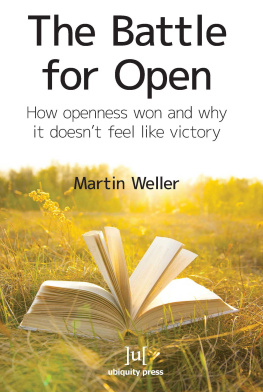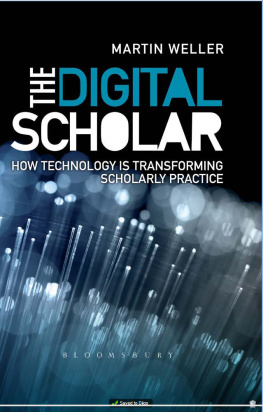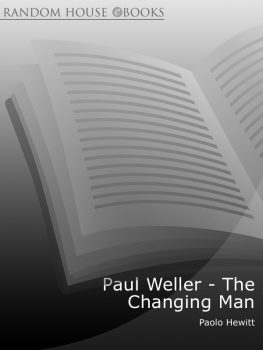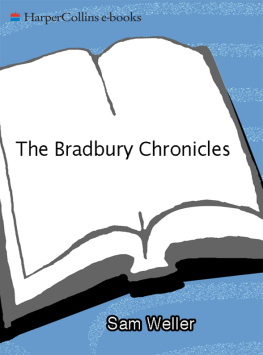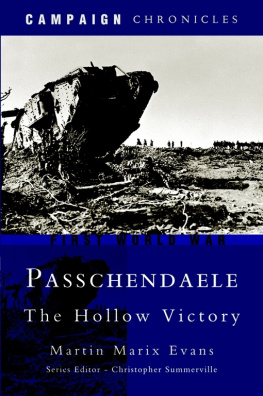Martin Weller - The Battle for Open: How openness won and why it doesnt feel like victory
Here you can read online Martin Weller - The Battle for Open: How openness won and why it doesnt feel like victory full text of the book (entire story) in english for free. Download pdf and epub, get meaning, cover and reviews about this ebook. publisher: Ubiquity Press, genre: Romance novel. Description of the work, (preface) as well as reviews are available. Best literature library LitArk.com created for fans of good reading and offers a wide selection of genres:
Romance novel
Science fiction
Adventure
Detective
Science
History
Home and family
Prose
Art
Politics
Computer
Non-fiction
Religion
Business
Children
Humor
Choose a favorite category and find really read worthwhile books. Enjoy immersion in the world of imagination, feel the emotions of the characters or learn something new for yourself, make an fascinating discovery.
- Book:The Battle for Open: How openness won and why it doesnt feel like victory
- Author:
- Publisher:Ubiquity Press
- Genre:
- Rating:4 / 5
- Favourites:Add to favourites
- Your mark:
- 80
- 1
- 2
- 3
- 4
- 5
The Battle for Open: How openness won and why it doesnt feel like victory: summary, description and annotation
We offer to read an annotation, description, summary or preface (depends on what the author of the book "The Battle for Open: How openness won and why it doesnt feel like victory" wrote himself). If you haven't found the necessary information about the book — write in the comments, we will try to find it.
The Battle for Open: How openness won and why it doesnt feel like victory — read online for free the complete book (whole text) full work
Below is the text of the book, divided by pages. System saving the place of the last page read, allows you to conveniently read the book "The Battle for Open: How openness won and why it doesnt feel like victory" online for free, without having to search again every time where you left off. Put a bookmark, and you can go to the page where you finished reading at any time.
Font size:
Interval:
Bookmark:
Chapter 1
It made me think that everything was about to arrive - the moment when you know all and everything is decided forever.
Jack Kerouac
Openness is everywhere in education at the moment: in late 2011 a free course in artificial intelligence had over 160,000 learners enrolled (Leckart 2012); in 2012 in the UK the Government followed other national bodies in the US and Canada by announcing a policy mandating that all articles resulting from publicly funded research should be made freely available in open access publications (Finch Group 2012); downloads from Apples iTunes U site, which gives away free educational content, passed 1 billion in 2013 (Robertson 2013); British Columbia announced a policy in 2012 to provide open, free textbooks for the 40 most popular courses (Gilmore 2012); the G8 leaders signed a treaty on open data in June 2013, stating that all government data will be released openly by default (UK Cabinet Office 2013). Outside of these headline figures there are fundamental shifts in practices: academics are creating and releasing their own content using tools such as Slideshare and YouTube; researchers are releasing results earlier and using open, crowdsourcing approaches; every day millions of people make use of free, open online tools and resources to learn and share.
In fact, openness is now such a part of everyday life that it seems unworthy of comment. This wasnt always the case, nor did it appear inevitable or predictable. At the end of the 90s, as the dot-com boom was gaining pace, there was plenty of scepticism around business models (much of it justified after the collapse) and similarly with the web 2.0 bubble ten years later. And while many of the business models were unsustainable, the traditional models of paying for content have also been shown not to map across to the new digital domain. Giving stuff away is no longer an approach to be mocked.
Nowhere has openness played such a central role as in education. Many of the pioneers of open movements have come from universities. The core functions of academics are all subject to radical change under an open model; from the Massive Open Online Courses (MOOCs) that are challenging teaching to pre-publication repositories that undermine the traditional publishing and review model of researchers, openness affects all aspects of higher education.
Openness has a long history in higher education. Its foundations lie in one of altruism and the belief that education is a public good. It has undergone many interpretations and adaptations, moving from a model which had open entry to study as its primary focus to one that emphasises openly available content and resources. This change has largely been a result of the digital and network revolution. Changes in other sectors, most notably the open source model of software production and values associated with the internet of free access, and open approaches have influenced (and been influenced by) practitioners in higher education. The past decade or so has seen the growth of a global open education movement, with significant funding from bodies such as the William and Flora Hewlett Foundation and research councils. Active campaigners in universities have sought to establish programmes that will release content including data, teaching resources and publications openly; others have adopted open practices through social media and blogs. This has been combined with related work on open licences, most notably that of Creative Commons, which allow easy reuse and adaptation of content, advocacy at policy level for nation- or state-wide adoption of open content and sharing of resources, and improved technology and infrastructure that make this openness both easy and inexpensive.
One might therefore expect this to be a time of celebration for the advocates of openness. Having fought so long for their message to be heard, they are now being actively courted by senior management for their experience and views on various open strategies. Open approaches are featured in the mainstream media. Millions of people are enhancing their learning through open resources and open courses. Put bluntly, it looks as though openness has won. And yet you would be hard pushed to find any signs of celebration amongst those original advocates. They are despondent about the reinterpretation of openness to mean free or online without some of the reuse liberties they had envisaged. Concerns are expressed about the commercial interests that are now using openness as a marketing tool. Doubts are raised regarding the benefits of some open models for developing nations or learners who require support. At this very moment of victory it seems that the narrative around openness is being usurped by others, and the consequences of this may not be very open at all.
In 2012 Gardner Campbell gave a keynote presentation at the Open Education conference (Campbell 2012) in which he outlined these concerns and frustrations. What we are seeing, he said, are developments in the higher education landscape that seem to meet every one of the criteria we have set forth for open education increased access, decreased cost, things that will allow more people than ever on a planetary scale, one billion individual learners at a time Isnt that what we meant? But as he explored different successes of openness his refrain was that of T. S. Eliot: thats not what I meant at all.
Why should this be the case? Can we dismiss it as just sour grapes? Are the advocates of openness merely exhibiting chagrin that others are now claiming openness? Is it just a semantic argument over interpretation that has little interest beyond a few academics? Or is it something more fundamental, regarding the direction of openness and the ways it is implemented? It is this central tension in openness, that of victory and simultaneous anxiety, that this book seeks to explore.
The focus of this book is primarily on higher education. The justification for this focus is that it is the area where the battle for open is perhaps most keenly contested. However, open education can be viewed as only one component of a broader open movement. There is an active open data community, which seeks to make data particularly governmental and corporation data openly available. Organisations such as the Open Knowledge Foundation see access to data as fundamental in accountability and engagement across a range of social functions, including politics, retail, energy, health, etc. This places openness as activism, of which education is only one aspect. As the Open Knowledge Foundation states, We want to see open knowledge being a mainstream concept, and as natural and important to our everyday lives and organisations as green is today (OKFN n.d).
The focus on education allows the battle for open to be explored in detail across four examples, although many of these intersect with the wider open movement, such as open access to published articles and the release of research data. Unlike some sectors which have had openness rather foisted upon them as a result of the digital revolution for example, the music industry and the arrival of sharing services such as Napster higher education has sought to develop open practices in a range of areas.
It is this scope that makes it such a vibrant area of study, encompassing publishing, teaching, technology, individual practices, broadcast and engagement. There is much that is relevant for other sectors here also, where one or more of these topics will be applicable, but rarely the entire range. It is frequently stated that higher education can learn lessons from other sectors that have been impacted by the digital revolution, such as newspapers, but the opposite may be true with regards to openness; other sectors can learn much from what is played out in the openness debate in higher education.
Next pageFont size:
Interval:
Bookmark:
Similar books «The Battle for Open: How openness won and why it doesnt feel like victory»
Look at similar books to The Battle for Open: How openness won and why it doesnt feel like victory. We have selected literature similar in name and meaning in the hope of providing readers with more options to find new, interesting, not yet read works.
Discussion, reviews of the book The Battle for Open: How openness won and why it doesnt feel like victory and just readers' own opinions. Leave your comments, write what you think about the work, its meaning or the main characters. Specify what exactly you liked and what you didn't like, and why you think so.

